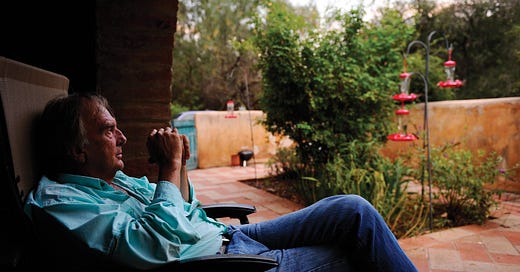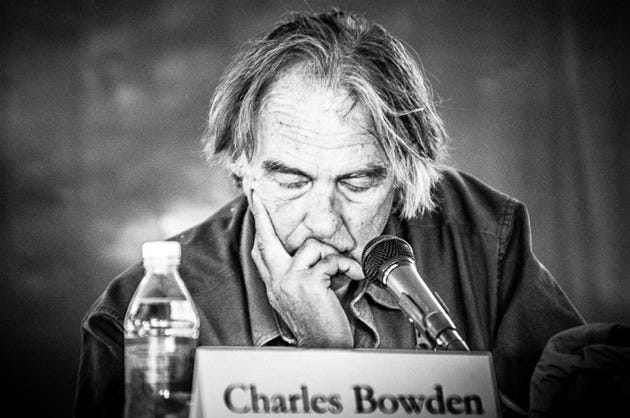"I am poor at remembering the past and much better at inhabiting it. Things that were actually exist to me. I am the enemy of history and yet a card-carrying member of the dead."
~ Charles Bowden
This is a repost from a “paid” article I posted last year. I removed the paywall because I think Bowden was an important writer. More people should hear about him. I hope you enjoy it. You can complement this article with Why You Should Read Charles Bowden.
The poet and novelist Jim Harrison called Charles Bowden America’s Most Alarming Writer. He was a writer who wrote about things that “everybody apparently thinks is too raw or difficult to talk much about.”
In Bowden’s own words:
"My life has been spent inside a culture of constant war and of vast slaughter of the beasts of the field and the grasses and forests of the land and of the fish in the sea and of the blue sky I was born under at the tail end of one of those wars.
I am of that culture and yet I am against that culture.
I am of my time and yet out of my time.
I drive fast down freeways but I have no belief that these roads lead to a future. Nor do I fear or dread the future. But I do fear for my culture and the human beings within and the beasts and plants without it that suffer in silence."
Charles Bowden was a tall, intimidating man who preferred the hot dry wastelands of the West to any inkling of a seaside paradise. He was a drinker and a smoker who wasn’t too keen on the insatiable appetites and the apathetic sensibilities of much of the modern world. And he wrote about it. Brilliantly.
"The problem is that we cannot imagine a future where we possess less but are more."
Chuck, what his friends called him, had a taste for red wine, the rich scent of women, and wrangling with the powerful. When he wasn’t writing and shit got heavy he was known to shoulder a 50-pound pack and venture off on foot across 110-degree deserts with a jug of water and a notepad.
“The desert sweeps on and on and the silence of the desert erases our egos. We finally begin to exist as something beyond our everyday cares and worries. The border of our body vanishes and we become one with the land.”
Bowden cherished the flora and fauna of the natural world and wrote poetically about it. But he was no nature writer. He never did feel comfortable with that prosaic term.
He was a modern-day Thoreau with a chip on his shoulder.
He once wrote: “I am part of a species where many find it forbidden to cross religious lines. Or race lines. I want to cross bloodlines. I want to risk my life for another organism, I want to shed my culture and join another culture, to meld with the beasts, to destroy the notion of parks and zoos and reserves and flow in a river of blood off some Niagara and be pounded into another life in the red pool below, the pool that churns and roars with spray and licks ones being with an overwhelming undertow.”
In his early years, shortly after walking out of his doctoral dissertation in college and ditching a teaching job at the University, Bowden became a reporter for a daily newspaper in Tucson, Arizona.
The horrors he witnessed took their toll. The border mayhem, the killings, the rapes, the drug wars, and worst of all — the kidnappings and slaughtering of children. He gave up the “shallow” newspaper business and became a freelance writer who drank at frequent intervals to forget what his eyes had seen. But he never shied away from the dark aspects of the human experience.
As William Langeweische wrote in the introduction to one of Bowden’s books:
“Bowden didn’t quit just the newspaper business; he ruthlessly ditched regular paychecks, withholding taxes, dinners at six, Sunday brunches, and any pretense of normal life. He was brave, maybe a bit nihilistic, and certainly reckless. He condemned himself to the uncertain and lonely existence of an independent writer and to a vow that he seems to have taken; to express himself with utter frankness, holding nothing back, even in the cases when no one wants to hear these things.”
I discovered the works of Bowden later in life, shortly after he died of a sudden illness in 2014 at the age of 69. I can’t remember how I found him, but as soon as I read the first few lines of one of his books, I knew I was reading one of the fiercest writers of our time.
His words flowed with juice and vitality.
Unpretentious and bold, this is what I’ve been so desperately looking for in our bland contemporary society — an unapologetic truthteller with prose like no other.
Today, I want to give you a little taste of his writing. The following is a passage from one of his finest books, Some of the Dead Are Still Breathing: Living in the Future.
I hope it sparks an interest in his essential works. Let’s go!
I live in a time of fear and the fear is not of war or weather or death or poverty or terror.
The fear is of life itself.
The fear is of tomorrow, a time when things do not get better but become worse. This is the belief of my time. I do not share it. The numbers of people will rise, the pain of migration will grow, the seas will bark forth storms, the bombs will explode in the markets, and mouths fighting for a place at the table will grow, as will the shouting and shoving.
That is a given.
Once the given is accepted, fear is pointless.
The fear comes from not accepting it, from turning aside one's head, from dreaming in the fort of one's home that such things cannot be. The fear comes from turning inward and seeking personal salvation. The bones must be properly buried, amends must be made. Also, the beasts must be acknowledged. And the weather faced, the winds and rains lashing the face, still, they must be faced. So too, the dry ground screaming for relief.
There is an industry peddling solutions, and these solutions insist no one must really change, except perhaps a little, and without pain. This is the source of the fear, this refusal to accept the future that is already here.
In the Old Testament, the laws insist we must not drink blood, that the flesh must be properly drained or we will be outcasts from the Lord. They say these rules were necessary for clean living in some earlier time.
I swallow the blood, all the bloods.
I am that outlaw, the one crossing borders.
The earlier time is over.
My work and research I put into this Substack Page are entirely reader-supported. If you enjoy the content I provide and are not ready to become a paid subscriber, you can simply make a one-time donation here at Buy Me A Coffee. If you can. I appreciate each one of you who follows this page. You all truly made it into a magical little online community. Thank You.







i had the pleasure of sharing a few emails with chuck; he was as blunt and serious in his daily communications as he was in his work. i'd say he was an influence on my writing, but only the need to be fearless and diligent; no one wrote quite like him. i wonder what he would have made of our current times. i don't think he'd be happy with us at all.
I lived in Tucson for nearly a quarter decade and worked as a freelance writer during the last few years of Bowden's active writing life. I encountered him a few times at events he was required to attend in order to market his books. There, he was quiet, polite, handsome, congenial and all-together self-possessed. He was an utterly revered symbol of the literary Wild West.